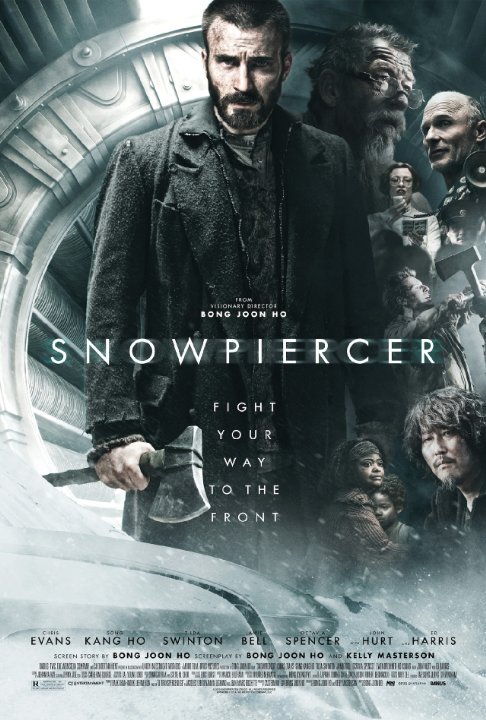Man, is this film overrated.
It’s an interesting premise and certainly offers a unique take on post-apocalyptic dystopia, but despite its visual invention and black humor, the ideas at its core feel trite.
The premise is pretty straightforward. Environmental devastation has driven mankind to seek a technological solution for climate change which backfires and instead turns the planet into a presumably uninhabitable tundra. Prior to the wintry techno Armageddon, a forward thinking industrialist constructs a global railway system and the titular train which carries the remnants of humanity in its various cars and endlessly circumnavigates the frozen waste.
Echoing the themes and visual metaphors of Metropolis and Animal Farm and numerous other dystopian fables, the downtrodden, impoverished proles are banished to the dim, grimy, squalid rear cars while the wealthy enjoy the comforts of the front cars. Order is enforced at gunpoint by a legion of goons who are lead by a caricature of a despot played by Tilda Swinton. Coming across like a visual mashup of Ayn Rand and Margaret Thatcher in quasi military regalia, she makes pompous pronouncements about maintaining the social order of the train. Everyone must maintain “Their Proper Place”.
After one of the children is taken away by the authorities for some unknown and nefarious purpose, the proles decide to initiate a revolution. Lead by the twin stereotypes of the Indomitable Rebel Leader (Chris Evans) and Wizened Sage (John Hurt), the band of revolutionaries begin a violent takeover of the train. This culminates in the inevitable showdown between the Indomitable Rebel and the Evil Puppet Master at the front of the train, Wilford.
This stuff is generally good grist for the drama mill when telling a dystopian SF story, but this is where the film goes off the rails (pun intended).
The film commits three crimes of peddling hackneyed tropes. The first is the Inverse Road to Serfdom Fallacy. The second is the cult of deference to a Great Leader. The third, while ultimately derived from the first two, is the idiotic notion of a fated social order which is either enforced by totalitarian rule or disrupted by a Liberating Leader.
The most egregious crime is of course the Inverse Road to Serfdom Fallacy. The notion that an industrialist who achieves success in the free market left to his own devices has totalitarian designs. He will subject an unwitting public to his technocratic Darwinian power games and will not hesitate to use violence to both keep the plebes in line and maximize efficiency. At the end of the film, Wilford offers Curtis the opportunity to be the new Great Leader because after all, the rubes need to be kept in line. One particularly cartoonish scene involves a school teacher indoctrinating the youth with cultish songs of praise toward Wilford which are undoubtedly meant to resemble those sung at gunpoint in North Korea.
The film essentially presents the acquisition of power, wealth and resources as a zero sum game and insists on perpetuating the dumb, reductive and counterproductive dichotomy of 99 percenters versus one percenters. There are haves and have nots and the haves will resort to violence and repression in order to preserve the social order and the only recourse for have nots is violent revolution.
Of course, all collective action is driven by the dictates of the Leaders from both sides. The rebellious proles only act when commanded to do so as do the armed goons who work for Wilford. There is no individual thought, action or initiative whatsoever. Everything hinges on The Leaders.
Despite its generally hamfisted approach to the themes, there are some surprising nuances. The film seems to be suggesting that privatized marine ecosystems will result in a sustainable food supply. And for those who believe in gun control, this film may disabuse the notion that gun ownership should be the sole province of agents of the state. There is a pretty blatant suggestion of entomophagy as a viable food alternative as well. Not exactly something you’re likely to see in your average Hollywood film for sure.
The visuals are cool and the combat scenes are insanely brutal.
Proceed at your own risk.

Hated the movie as well.There were so many questions i had after watching it. But somehow people loved it. Really loved your review. If you like post apocalyptic ideas I’m finishing up one now that should be out in a few months, check it out and let me know what you think. http://joereyesauthor.com/2015/04/22/aftermath-teaser/
LikeLiked by 1 person